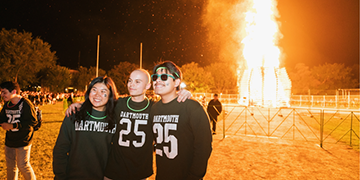Beilock Pledges Total Commitment to Academic Freedom
Dartmouth leaders speak to the alumni community in a special town hall meeting

May 14, 2025
5 minute read
James Bressor
5 minute read
Speaking Tuesday in a virtual town hall, President Sian Leah Beilock and top members of her administration reiterated Dartmouth’s commitment to academic freedom, embracing diversity as a key component to academic excellence, forming and joining coalitions to defend higher education, protecting vulnerable students, and safeguarding the College’s financial aid and research programs, which depend on the endowment for much of their funding.
President Beilock opened the meeting by saying government overreach into the operations of colleges and universities threatens to diminish the output of higher education, which has long fueled breakthroughs in medicine and industry, reduce the affordability of a college education, and drive away exceptional students from other countries.
Some members of the Dartmouth community have criticized the College in recent weeks for not signing on to a statement developed by the American Association of Colleges and Universities challenging the Trump Administration’s interference in higher education governance and funding cuts.
Beilock said while she supports much of the AAC&U statement, she believes the best way to stand up to assaults on higher education’s independence is through action. She cited a series of steps Dartmouth has taken over the past four months:
- Advocating with elected officials and policymakers: Beilock has made four trips to Washington since January, and Dartmouth officials are in frequent, nearly daily, communication with members of Congress and other government officials to raise awareness of the positive impact of higher education’s research contributions, which power American competitiveness, and the potentially devastating consequences of several policy proposals.
- Taking legal action: Through its membership in the American Association of Universities, a consortium of 71 leading research universities, Dartmouth has supported four lawsuits challenging the government’s efforts to limit funding for grantmaking institutions. Two of these have already resulted in injunctions, and the other two will soon be heard by the courts. Beilock added that Dartmouth also anticipates supporting Harvard by filing an amicus brief in its litigation against the federal government over its targeted loss of funding.
- Collaborating: Beilock and members of the Dartmouth Senior Leadership Team are working closely with colleagues at peer institutions to advance common interests and defend higher education.
- Providing a financial backstop: The College has been able to provide bridge funding for some Dartmouth researchers who’ve lost grant funding.
- Raising awareness: Dartmouth is striving to make more people aware of the far-reaching positive impact of government-funded research at Dartmouth and peer institutions.
Fundamental to all these actions, Beilock said, are the bedrock belief in higher education self-governance and Dartmouth’s ongoing dedication to advancing diversity in service of academic excellence and welcoming students from around the world.
“I want to be very clear that Dartmouth’s mission and values don’t change depending on who is in office,” Beilock said. “We live by the same mission and values regardless of the thoughts of the day, and that means investing in and doubling down on diversity, which is something that’s so important to academic excellence. I believe in diversity. I believe in the power of having different people with different experiences, different ideas, at the table pushing at each other.”
Dartmouth’s Senior Leaders Weigh In
Joining Beilock in the town hall, which drew nearly 2,700 attendees, were Provost David Kotz ’86, Senior Vice President for Communications and Government Relations Justin Anderson, Senior Vice President Shontay Delalue MED’24, Senior Vice President and General Counsel Matt Raymer ’03, and Director of the Office of Visa and Immigration Services Susan Ellison. Cheryl Shepard ’90, president of the Alumni Council, moderated the event. Attendees were invited to submit questions in advance.
Provost Kotz warned of the possible damage caused by a proposed tenfold tax increase on university endowments, from 1.4% to 14%. He noted that 25% of Dartmouth’s endowment is dedicated to providing financial aid to students—and approximately half of all undergraduates receive financial aid—and nearly 40% of the endowment supports research.
“It will be incumbent on schools like us to ensure that our innovation ecosystem keeps going to maintain the United States’ scientific leadership,” he said.
The loss of government grant funding represents another potential significant loss of funding, Kotz said. “So far, we’ve seen only a few grants canceled at Dartmouth, perhaps a dozen or so, but they’ve impacted all disciplines at this point—from the arts and sciences to the medical school to the engineering school.”
Kotz said as Dartmouth prepares for the possibility of receiving fewer grants or having more existing grants cancelled, the College is carefully planning its financial future. He added that although Dartmouth has been able to provide some bridge funding for faculty who have lost federal funding, it cannot replace those funds for the long term.
Kotz and Ellison both addressed a question regarding how Dartmouth is protecting undocumented students and international faculty, staff, and students. Ellison said her office is communicating more frequently than ever with these segments of the campus community and hosting more information sessions. She added that she has met with the directors of the Department of Safety and Security and the International Student Experience Office to share information regarding site visit protocols in case an enforcement action by Immigration and Customs Enforcement or other federal agencies takes place on campus.
“We have no reason to believe that ICE or other immigration officials are targeting Dartmouth specifically,” Kotz stated. “We have clear policies and protocols in place to react and respond. We’ve recently clarified our long-existing policy about the presence of law enforcement personnel on campus to make it clear that they cannot access non-public spaces without a judicially signed warrant. We are a private campus, and that would be required for any law enforcement official who needed to come to campus.”
Anderson emphasized how closely Dartmouth’s Office of Government Relations is working with the College’s peers, often communicating multiple times each day as news comes out of Washington.
“We are constantly evaluating and assessing what we are learning,” Anderson said. “This is an all-hands-on-deck, full Dartmouth team effort.”
Beilock concluded the hour-long town hall by invoking Dartmouth’s North Star and asking alumni to speak up for Dartmouth and higher education at this moment of need.
“Our goal is to go and find the best and brightest students who are excelling wherever they are in society, bring them to Dartmouth, and teach them how to think, not what to think, so they can go out and be leaders of our democracy,” Beilock said. “What you can do is contact your representatives. Talk about the power of higher education, cuts to our federal funding, increases in an endowment tax, that government dictating what we can and can’t teach or do is not in the spirit of higher education. Our higher education institutions have been the crown jewel of this country for so long.”
Dartmouth has created a Federal Relations Updates page to provide information about the College’s ongoing advocacy.






